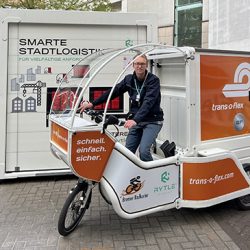The delivery of trans-o-flex consignments by cargo bikes, which started in Bremen in May, has been so successful that the pilot has been extended and is to be expanded. “We are currently testing whether we can also deliver ambient consignments with the help of a special temperature box that can heat or cool during transport,” says Michael Löckener. He is responsible for the pilot project as Business Unit Manager Operations Area Production at trans-o-flex. “Before being piloted in practice, the temperature box would still be extensively tested in the laboratory and then initially used for the transport of specially prepared parcels.” Specific ideas are already in place for the subsequent practical application: The box can be transported either in the load compartment of the cargo bike or with a trailer.
“From the beginning, our goal was to test not only the delivery of conventional consignments, but also of temperature-controlled consignments,” Löckener reports. “Thatwas one of the reasons why we chose a system bike from the Bremen-based company Rytle for the pilot phase, as they already offer a solution for temperature control.”
The two cargo bikes used in the pilot in Bremen can accommodate an interchangeable box with around 1.4 cubic metres of loading space and have a payload of 180 kilos. The delivery couriers load the bicycles in the morning from a special swap body for which trans-o-flex has been given a parking space in Bremen’s city centre. The swap body serves as a mini-hub that is loaded early in the morning from a trans-o-flex truck with consignments to be delivered. In the evening, consignments that have been collected by the couriers can be transported from the mini-hub to the trans-o-flex branch in Bremen and from there to the consignees.
The cargo bikes have two electric motors. They are built into the rear wheels and assist the riders up to a speed of 25 km/h. “Because the cargo bikes start in the middle of the delivery area, the distances are very short and, to date, the couriers have travelled less than 20 kilometres a day.” Thanks to exchangeable batteries, the riders have enough power even for much longer delivery routes, without having to recharge during the day. The batteries are charged overnight in the mini-hub.
Initially, the bike couriers only delivered parcels weighing a maximum of ten kilos. “In the meantime, we have increased the maximum unit weight to 15 kilos, which is also going well,” Löckener explains. “This has allowed us to increase the utilisation of the routes and the productivity of the bike couriers is now close to that of a normal van route.” The pilot, which was originally limited to three months, has now been extended until the end of April, so that experience can be gained over a whole year with all weather conditions.

